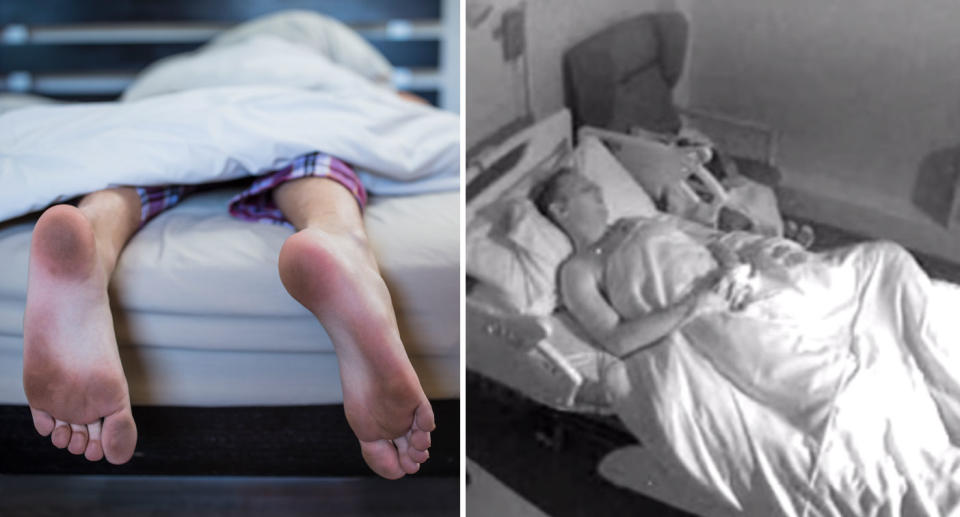The terrifying sleep phenomenon affecting thousands of people
There’s a very good reason the human body becomes paralysed while we sleep. It is what keeps us from running rampant through the house and acting out our dreams.
But for many, this immobility is a source of a traumatic and dreaded night-time experience called sleep paralysis, which occurs when the mind is awake but the body isn’t.
Biologically it can be explained by the body being in its muscle atonia state – meaning the muscles are paralysed – during REM (rapid eye movement) sleep when the brain begins to wake up.
For individuals who experience it however, most recall being trapped for anywhere between a few seconds to several minutes in a terrifying real-life nightmare.

“They have the sensation where they’re lying there and they can’t move, and it’s often quite frightening,” Melbourne sleep psychologist Frank Cahill told Yahoo News Australia.
“It’s totally benign, and it’s pretty safe,” he added.
But those who frequently experience sleep paralysis might disagree, with many recalling what they believe to be near-death ordeals.
‘It was like a large hand gripping me’
Several people report demonic auditory hallucinations during sleep paralysis, while some say they feel, see, “sense” and smell other beings in their room.
A Perth woman, who chose not to be named, has been free from sleep paralysis for many years, but recalled a painful sensation of being “gripped” around the waist.
“(I had) Intense pain in my left side, around my waist, like a large hand gripping, auditory hallucinations, (and) different scents,” she told Yahoo News Australia.
She also explained feelings of having something “perched” on her chest and the presence of “beings”.

Thousands of others have shared individual experiences online in a Facebook group discussing the sleep state, all recalling similarly creepy personal events.
“I can't move and it’s hard to breathe, not like something is on my chest but more like something over my face and I can't seem to open my eyes,” a social media user shared.
“Just woke up from a demon choking me in my sleep paralysis episode. Makes me cry, I couldn’t move of course and praying didn’t help,” another sufferer said.
“It's like my sleep demons are trying to trick me into believing I'm awake when really I'm in sleep paralysis,” a third person said.
Some believe sleeping on their back triggers episodes of sleep paralysis while others made parallels to mental illness.
Experts say however it has much to do with sleep deprivation and often the abuse of drugs or alcohol.
What causes sleep paralysis?
The University of Sydney’s Delwyn Bartlett, who is a clinical associate professor at the Central Clinical School of Medicine, said the true cause of sleep paralysis was still unknown.
“For some reason as you start to come out of REM sleep, and whatever switch it is that keeps us in that semi-paralysed state doesn’t switch off,” Ms Bartlett told Yahoo News Australia.
“You will wake up able to use your eyes, you can look around, your heart’s beating and you can breathe, but you can’t move.
“It’s very scary, especially if you haven’t experienced it before and if you haven’t known of anybody who’s had it. So there you are awake, and you can’t move.
“It’s often triggered by too much alcohol or drugs, and it can sometimes be triggered by sleep deprivation.”

But Ms Bartlett added people should feel secure knowing they were not going to stop breathing or die.
“It is scary because you can’t move until your body starts to catch up with your brain.”
“There’s a sense of sometimes a claustrophobia within your own body that goes with that. It’s a bit like if you woke up and found yourself in a straight jacket
Ms Barlett said it was important people remained calm and tried slowing down their breathing, while Mr Cahill said they could try some small movement.
“Usually the way you get out of it is by remaining calm and by wiggling a finger or a toe, that just slowly gets you mobile and breaks you out of the paralysis,” Mr Cahill said.
“If it’s going to happen, it will in the later part of the night, that’s when we have most of our REM sleep.”
Do you have a story tip? Email: newsroomau@yahoonews.com.
You can also follow us on Facebook, download the Yahoo News app from iTunes or Google Play and stay up to date with the latest news with Yahoo’s daily newsletter. Sign up here.

